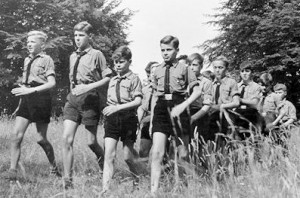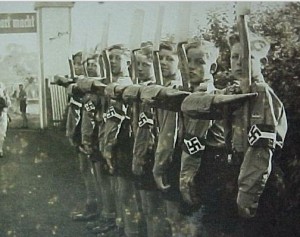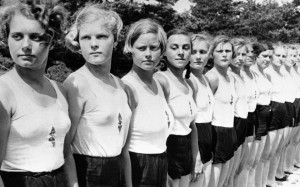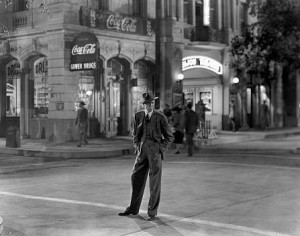In a scene from Not Your Heart Away Liz and Peter, Ben and Claire visited their very first grown-up restaurant on their own, in an imaginary Stratford on Avon in an imaginary time, based on imaginary people who bear absolutely no resemblance to the younger selves of a respected barrister, a local newspaper editor, me and a California schoolteacher whatsoever it is submitted m’lud, where their dinner was interrupted. For the idiot Ben, who constantly deluded himself that the sexual revolution meant that 18 year-old girls would do the asking (oh Ben, think how much more fun you could have had…) that dinner was one of a string of humiliations and disappointments that we look back on and describe as a good preparation for life before we turn away and silently curse the wall when no-one’s looking. Or maybe that’s just me.
For the old man with the accent who interrupted their dinner and apologised for spoiling it, the man who was indignant at being described as a Nazi just because he’d served in the Hitler Youth, it was something else. I’ve said before, I don’t think I have an awful lot of imagination. I listen to stories. I jumble them up and glue them together into another, bigger story, but everything I’ve ever written happened to someone real. Just not usually one person, or one person at one time. Something I saw or heard or someone else’s story. That old man’s story for example.
 It happened one summer’s afternoon in Kings Langley, just outside Watford. I didn’t have much to do. We were either between jobs or more accurately part-way through one, where everything that could have been done had been done and now we had to wait until other people had done other things so more things could be done. We locked the doors and got our mobile phones and walked down through the fields, across the river, across the canal, over the footbridge over the M25 and up the hill to the pub at the top of Kings Langley, near the Rudolf Steiner school.
It happened one summer’s afternoon in Kings Langley, just outside Watford. I didn’t have much to do. We were either between jobs or more accurately part-way through one, where everything that could have been done had been done and now we had to wait until other people had done other things so more things could be done. We locked the doors and got our mobile phones and walked down through the fields, across the river, across the canal, over the footbridge over the M25 and up the hill to the pub at the top of Kings Langley, near the Rudolf Steiner school.
A short, thickset, shaven-headed man was having an argument with a much older, white-haired, aquiline-looking man with an accent. Look, I said wittily, that’s Rudolf Steiner. I know. It just pours out of me, doesn’t it? It hardly ever stops. But I was wrong. The old man’s story was much more interesting, because here he was, here and now, the way most of them aren’t now, because this was fifteen years ago and all flesh is grass.
The old man was furious at being called a Nazi, just because he’d been in the Hitler Youth. He was conscripted. He had had no choice. Every single German boy was conscripted into the Hitler Youth. No-one had ever heard of the Eidelweiss Pirates, or the few that had didn’t talk about them. I’ve since met an Army Major who had dinner with one of the survivors, but I only heard about the boys who skipped out of the Hitler Jugend a few years ago. The old man I met thought it was great. His eyes were shining as he remembered the songs and the campfires, the flags and bugles, the friendship and the pure fun of the big rallies in the woods. He wasn’t the boy who sang Tomorrow Belongs To Me at the end of Cabaret. He didn’t have to. Millions of people felt like that, before the guns began again.
He went to school in a little German village in the hills and one day in April 1945 the SS arrived in a big car. They took all the boys from the school up the lane to a field where they’d dug a bunker, where they handed out oily new machine guns and helmets and grenades and told the boys to defend their village and the Fatherland. The American invaders would arrive to spoil and loot within the hour. Meanwhile the SS felt they had pressing business to attend to the other side of the hill, in Switzerland. Can’t stop. Love to. See you soon. Oh actually, we won’t. Take care.
 The schoolmaster was as he usually was, the leader of this troop of Hitler Jugend. He marched them down to the playground and lined them up on parade to inspect them and their brand-new factory-fresh MP40s and Panzerfausts. Then he beat them senseless. He made them throw every last gun, grenade and bullet in the ditch then sent them home weeping. He saved all of their lives. As the old man said, when the Americans arrived standing in jeeps behind .50 calibre Brownings, a gun so powerful that that if you get one pointed at you there is nothing on a city street it will do you any good to hide behind, they would have shot everything and anything. ‘They looked like they would poop their pants,’ he said.
The schoolmaster was as he usually was, the leader of this troop of Hitler Jugend. He marched them down to the playground and lined them up on parade to inspect them and their brand-new factory-fresh MP40s and Panzerfausts. Then he beat them senseless. He made them throw every last gun, grenade and bullet in the ditch then sent them home weeping. He saved all of their lives. As the old man said, when the Americans arrived standing in jeeps behind .50 calibre Brownings, a gun so powerful that that if you get one pointed at you there is nothing on a city street it will do you any good to hide behind, they would have shot everything and anything. ‘They looked like they would poop their pants,’ he said.
A friend’s father landed in Normandy on D-Day. He walked to Germany from there. He would never talk about the German he killed. He only talked sketchily about the German boy in uniform who tagged along with his regiment for food and company, after they’d checked his pockets thoroughly. He left two pictures, both of them young German boys in uniform, both way under 20. I don’t know which is which, or whether either of them are those two boys, nor what became of them.
Soon there will be no-one left to tell these stories. They will still tell them in other places, in future times. But the tellers won’t be people like us. We won’t understand. We’ll say oh, that’s what they do in these foreign places. They always have. It’s tribal, isn’t it? But we’ve done this too, not so long ago. That’s what School Lane is about. Now all I have to do is write it.
 I wanted to find out more about German villages and the Eidelweiss Pirates so I turned, as you do for everything these days, to Google. All I wanted to do was find some pictures that would show me a German village, so I could imagine the mood of it in my head. Richard Curtis played one song over and over again when he was writing films, so I thought I could allow myself this one small indulgence. I don’t do this a lot. Honest, guv. It was just the once. For research. For this book and that. To see what was there. That’s the only reason I was looking at pictures like that, straight up, as they used to say on The Sweeney.
I wanted to find out more about German villages and the Eidelweiss Pirates so I turned, as you do for everything these days, to Google. All I wanted to do was find some pictures that would show me a German village, so I could imagine the mood of it in my head. Richard Curtis played one song over and over again when he was writing films, so I thought I could allow myself this one small indulgence. I don’t do this a lot. Honest, guv. It was just the once. For research. For this book and that. To see what was there. That’s the only reason I was looking at pictures like that, straight up, as they used to say on The Sweeney.




